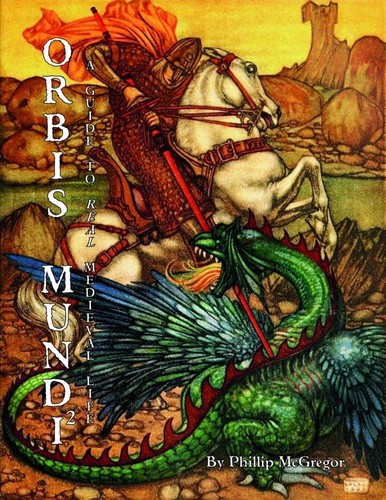Pubblicato il 2017 da Phalanx Games Design.
Orbis Mundi 2
Rated as a 'Project We Like' on KickStarter and successfully backed by almost 500 people!
Most fantasy role playing games use elements if the Middle Ages in their background ... but they provide little or nothing in the way of real background ... and what they do provide is generally anachronistic, misleading or downright wrong.
Orbis Mundi 2 is a massive expansion of the information presented in the first edition and is intended to provide Game Masters and Players with a better understanding of key aspects of Medieval life – with more accurate and more up-to-date information based on deeper research than most RPG designers carry out.
The material inside includes chapters on –
- City & Country, covering the organisation and likely contents of Towns and Villages, Medieval Agriculture, the nature and contents of the Medieval countryside outside of settled areas and more.
- …
Rated as a 'Project We Like' on KickStarter and successfully backed by almost 500 people!
Most fantasy role playing games use elements if the Middle Ages in their background ... but they provide little or nothing in the way of real background ... and what they do provide is generally anachronistic, misleading or downright wrong.
Orbis Mundi 2 is a massive expansion of the information presented in the first edition and is intended to provide Game Masters and Players with a better understanding of key aspects of Medieval life – with more accurate and more up-to-date information based on deeper research than most RPG designers carry out.
The material inside includes chapters on –
- City & Country, covering the organisation and likely contents of Towns and Villages, Medieval Agriculture, the nature and contents of the Medieval countryside outside of settled areas and more.
- Kingdoms & Crowns, which deals with the Feudal System … not just the usual pastiche of the Anglo-Norman version but also including a detailed look at it and the French variant as well as some idea of how it worked in other areas of (mainly Western) Europe. Law & Justice is also covered – again, not just the Anglo-French ‘norm’, but some information about the rest of Europe, as is the complex issue of Money … and its regional variations.
- De Civitate Dei (‘The City of God’) looks at the main Medieval religions (and heresies) – Catholicism, Orthodoxy, Judaism and Islam, how they were organised, what they believed, how they viewed each other and so forth.
- De Re Militari (‘On Military Matters’) covers military organisation, by region and ethnicity, the cost of warfare and logistical matters, Weapons and Armour, Castles and Sieges.
- Ars Mechanica (‘Mechanical Arts’) looks at the technological and business side of the medieval period (they didn’t really differentiate).
- Ars Scholastica (‘Scholastic Arts’) looks at the educational side of things – and what passed for the ‘scientific’ side as well, looking at everything from Reading & Writing through to University Education as well as Alchemy (Chemistry) and Medicine.
- Daily Life covers all those things that don’t fit elsewhere – how they thought and what they believed, Hygiene, Leisure activities, Names, Calendars and timekeeping, Weights and Measures and Heraldry
Note: The Original Orbis Mundi included a large section with an Annotated Price List ... OM2 doesn't, the Price List will be in a second volume, which will also be considerably expanded in page count, tentatively titled "Orbis Mundi2: The Marketplace"
If you think that your favourite FRPG has a background that is the most accurate representation of the Middle Ages since the Middle Ages, then Orbis Mundi is not for you.
If you don’t care about historical accuracy in even the slightest respect, then Orbis Mundi is not for you.
If you do care about historical accuracy and much, much, more ...
Then Orbis Mundi is for you!
